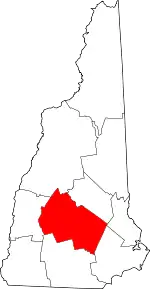Hopkinton, New Hampshire
Hopkinton is a town in Merrimack County, New Hampshire, United States. The population was 5,589 at the 2010 census.[1] The town has three distinct communities: Hopkinton village, mainly a residential area in the center of the town; Contoocook, the town's business hub, located in the north; and West Hopkinton, within the more agricultural portion of the town. The town is home to the Hopkinton State Fair, adjacent to Contoocook village, and to the historic Contoocook Railroad Depot and the Contoocook Railroad Bridge, the oldest covered railroad bridge in the United States.[2]
Hopkinton, New Hampshire | |
|---|---|
 Town hall | |
 Seal | |
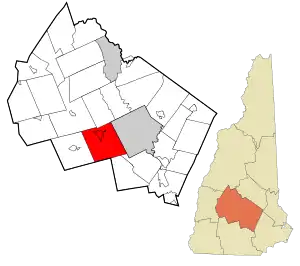 Location in Merrimack County and the state of New Hampshire. | |
| Coordinates: 43°11′29″N 71°40′31″W | |
| Country | United States |
| State | New Hampshire |
| County | Merrimack |
| Granted | 1735 |
| Settled | 1736 |
| Incorporated | January 10, 1765 |
| Villages | Hopkinton Contoocook West Hopkinton |
| Government | |
| • Select Board | Sabrina Dunlap, Chair Ken Traum Steven Whitley Anna Wells Jeffrey Donohoe |
| • Town Administrator | Neal Cass |
| Area | |
| • Total | 45.2 sq mi (117.0 km2) |
| • Land | 43.4 sq mi (112.3 km2) |
| • Water | 1.8 sq mi (4.6 km2) 3.99% |
| Elevation | 505 ft (154 m) |
| Population (2010) | |
| • Total | 5,589 |
| • Estimate (2018) | 5,739 |
| • Density | 131/sq mi (50.5/km2) |
| Time zone | UTC−5 (Eastern) |
| • Summer (DST) | UTC−4 (Eastern) |
| ZIP code | 03229 |
| Area code(s) | 603 |
| FIPS code | 33-37540 |
| GNIS feature ID | 0873630 |
| Website | www |
History

The town was granted by Colonial Governor Jonathan Belcher in 1735 as "Number 5" to settlers from Hopkinton, Massachusetts, who renamed it "New Hopkinton." First settled in 1736, colonists were required to build homes, fence in their land, plant it with English grass, and provide a home for a minister, all within seven years. The community would be incorporated in 1765 by Governor Benning Wentworth.[3] Built in 1789, the Congregational Church has a Revere bell.[4] The legislature met in Hopkinton occasionally between 1798 and 1807. In 1808, the town competed for the coveted position of state capitol, but was defeated by nearby Concord.
_(14590292740).jpg.webp)
A substantial portion of the town in the north was named "Contoocook Village" for a tribe of the Pennacook Indians who once lived there. Due to its position along the Contoocook River, it became a center for water-powered industry, particularly lumber and textiles. The Contoocook covered railroad bridge in the village is a remnant of the Boston & Maine Railroad and is the oldest covered bridge of its kind still standing in the United States.[2] Next to the bridge is the Contoocook Railroad Depot, one of the original railroad depots for the Concord and Claremont Railroad.
Since 1915, Hopkinton has been home to the Hopkinton State Fair, an event which attracts thousands of visitors each year during the Labor Day weekend.[5]
Geography
According to the United States Census Bureau, the town has a total area of 45.2 square miles (117.0 km2), of which 43.4 square miles (112.3 km2) is land and 1.8 square miles (4.6 km2) is water, comprising 3.95% of the town.[1] Hopkinton is drained by the Contoocook and Warner rivers. The highest point in town is Shaker Hill, on the border with Henniker, with an elevation of 923 feet (281 m) above sea level. Hopkinton lies fully within the Merrimack River watershed.[6]
Demographics
| Historical population | |||
|---|---|---|---|
| Census | Pop. | %± | |
| 1790 | 1,715 | — | |
| 1800 | 2,015 | 17.5% | |
| 1810 | 2,216 | 10.0% | |
| 1820 | 2,437 | 10.0% | |
| 1830 | 2,474 | 1.5% | |
| 1840 | 2,454 | −0.8% | |
| 1850 | 2,169 | −11.6% | |
| 1860 | 2,178 | 0.4% | |
| 1870 | 1,814 | −16.7% | |
| 1880 | 1,836 | 1.2% | |
| 1890 | 1,817 | −1.0% | |
| 1900 | 1,652 | −9.1% | |
| 1910 | 1,578 | −4.5% | |
| 1920 | 1,438 | −8.9% | |
| 1930 | 1,485 | 3.3% | |
| 1940 | 1,587 | 6.9% | |
| 1950 | 1,831 | 15.4% | |
| 1960 | 2,225 | 21.5% | |
| 1970 | 3,007 | 35.1% | |
| 1980 | 3,861 | 28.4% | |
| 1990 | 4,806 | 24.5% | |
| 2000 | 5,399 | 12.3% | |
| 2010 | 5,589 | 3.5% | |
| 2018 (est.) | 5,739 | [7] | 2.7% |
| U.S. Decennial Census[8] | |||

As of the census[9] of 2010, there were 5,589 people, 2,204 households, and 1,631 families residing in the town. The population density was 124.7 people per square mile (48.2/km2). The racial makeup of the town was 97.7% White, 0.3% African American, 0.1% Native American, 0.6% Asian, 0.07% Pacific Islander, 0.1% from other races, and 1.2% from two or more races. Hispanic or Latino of any race were 1% of the population.
There were 2,204 households, out of which 32.8% had children under the age of 18 living with them, 63.1% were married couples living together, 7% had a female householder with no husband present, and 26% were non-families. 19.6% of all households were made up of individuals living alone, and 6.3% had someone living alone who was 65 years of age or older. The average household size was 2.54 and the average family size was 2.92.
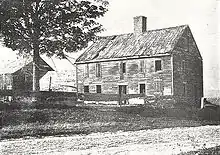
In the town, the population was spread out, with 25.3% under the age of 20, 3.3% from 20 to 24, 20.1% from 25 to 44, 35.2% from 45 to 64, and 16.2% who were 65 years of age or older. The median age was 45.8 years.
The median income for a household in the town was $84,911, and the median income for a family was $88,796. Males had a median income of $53,806 versus $45,656 for females. The per capita income for the town was $40,580. About 4.2% of the population was below the poverty line.
Government
In the New Hampshire Senate, Hopkinton is in the 15th District, represented by Democrat Dan Feltes. On the New Hampshire Executive Council, Hopkinton is in the 2nd District, represented by Democrat Andru Volinsky. In the United States House of Representatives, Hopkinton is in New Hampshire's 2nd congressional district, represented by Democrat Ann McLane Kuster.
Education
Public education is managed by the Hopkinton School District. Kindergarten through third-grade students attend Harold Martin School in Hopkinton village, and fourth through sixth graders attend Maple Street School in Contoocook village. The middle school is combined with Hopkinton High School in Contoocook village, which serves seventh through twelfth graders, and its sports teams are nicknamed the Hawks.
According to a study conducted in early 2014 by U.S. News & World Report, Hopkinton High School was ranked 1st among New Hampshire's public schools. Hopkinton High School has also been awarded a national silver medal and is ranked nationally #711 of the 19,400 public schools in the US. The school has ranked 1st consistently by U.S. News in 2015 and 2016.[10][11]
The town of Hopkinton also includes The Beech Hill School, an independent middle school serving grades 6th through 8th.[12]
Notable people
- Rose Flanders Bascom (1880–1915), first American female lion tamer
- Carlton Chase (1794–1870), bishop of the Episcopal Diocese of New Hampshire
- Thomas Corbett (1780–1857), a Shaker doctor that was well known nationally for his botanical medicines
- Alvan Flanders (1825–1884), delegate from the Territory of Washington
- John Williams Gunnison (1812-1853), captain and surveyor with Corps of Topographical Engineers. Attended Hopkinton Academy.
- Matthew Harvey (1781–1866), lawyer, politician and 13th Governor of New Hampshire
- Otto and Vivika Heino (1910–2009), husband and wife ceramics artists
- John S.C. Knowlton (1798–1871), newspaper editor, publisher and politician
- Ann McLane Kuster (b. 1956), current U.S. congresswoman representing New Hampshire's Second District
- Mary Greenleaf Clement Leavitt (1830–1912), first round-the-world missionary for the Woman's Christian Temperance Union
- Stephen Harriman Long (1784–1864), engineer, explorer, inventor
- David Luneau (b. 1965), Independent member of the New Hampshire House of Representatives, inventor
- John Lynch (b. 1952), 80th Governor of New Hampshire
- Susan Lynch, First Lady of New Hampshire to John Lynch
- George H. Perkins (1836–1899), Commodore for the United States Navy
- Isabel Weld Perkins (1876–1948), Boston area heiress, author and daughter of George H. Perkins
- Elizabeth Wentworth Roberts (1871–1927), American painter and founder of the Concord Art Association
- Tina Satter, New York City-based playwright and director
- Irene Shepard (1922–2014), educator and politician
- David Souter (b. 1939), former associate justice of the US Supreme Court
- Richard Sylla, writer and professor.
- Susan Ware (b. 1950), independent scholar, writer and the general editor at the American National Biography
Register of Historic Places
| [13] | Name on the Register[14] | Image | Date listed[15] | Location | City or town | Description |
|---|---|---|---|---|---|---|
| 1 | Contoocook Railroad Depot | 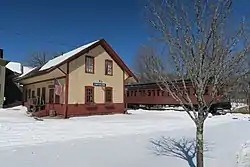 Contoocook Railroad Depot |
March 16, 2006 (#06000131) |
896 Main St. 43°13′21″N 71°42′47″W |
Contoocook Village | Owned by the Contoocook Riverway Association |
| 2 | Hopkinton Railroad Covered Bridge | 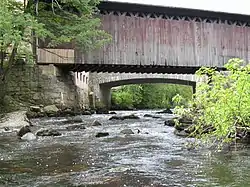 Hopkinton Railroad Covered Bridge |
January 11, 1980 (#80000294) |
Off NH 103 and NH 127 43°13′23″N 71°42′51″W |
Contoocook Village | Over Contoocook River in village of Contoocook |
| 3 | Howe-Quimby House | 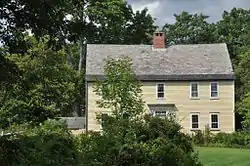 Howe-Quimby House |
June 27, 1980 (#80000295) |
862 Sugar Hill Rd. 43°09′29″N 71°42′03″W |
Hopkinton | |
| 4 | William H. Long Memorial | 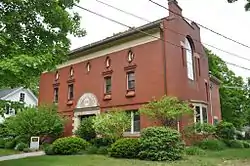 William H. Long Memorial |
July 15, 1977 (#77000092) |
300 Main St. 43°11′27″N 71°40′19″W |
Hopkinton Village | Now houses the Hopkinton Historical Society. |
| 5 | Rowell's Covered Bridge | 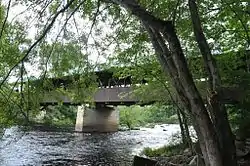 Rowell's Covered Bridge |
November 21, 1976 (#76000129) |
Clement Hill Rd. 43°11′33″N 71°44′54″W |
West Hopkinton | Over Contoocook River |
| 6 | Stanley Tavern | 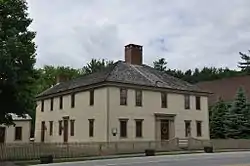 Stanley Tavern |
September 7, 2005 (#05000970) |
371 Main St. 43°11′29″N 71°40′27″W |
Hopkinton Village |
Sites of interest
References
- "Geographic Identifiers: 2010 Demographic Profile Data (G001): Hopkinton town, Merrimack County, New Hampshire". U.S. Census Bureau, American Factfinder. Archived from the original on February 13, 2020. Retrieved December 1, 2015.
- "RAILROAD BRIDGE, Hopkinton, New Hampshire". New Hampshire Division of Historic Resources. Retrieved 2008-01-10.
- "History of Hopkinton". J. W. Lewis and Co.
- Chapter XXVII. Charles Chase Lord. 1890.
- "Archived copy". Archived from the original on 2014-07-26. Retrieved 2014-05-30.CS1 maint: archived copy as title (link)
- Foster, Debra H.; Batorfalvy, Tatianna N.; Medalie, Laura (1995). Water Use in New Hampshire: An Activities Guide for Teachers. U.S. Department of the Interior and U.S. Geological Survey.
- "Annual Estimates of the Resident Population: April 1, 2010 to July 1, 2018 (PEPANNRES): Minor Civil Divisions – New Hampshire". Archived from the original on February 13, 2020. Retrieved June 18, 2018.
- "Census of Population and Housing". Census.gov. Retrieved June 4, 2016.
- "U.S. Census website". United States Census Bureau. Retrieved 2008-01-31.
- https://www.usnews.com/education/best-high-schools/new-hampshire
- https://www.usnews.com/education/best-high-schools/new-hampshire/districts/hopkinton-school-district/hopkinton-high-school-12390
- http://www.thebeechhillschool.org/
- Numbers represent an alphabetical ordering by significant words. Various colorings, defined here, differentiate National Historic Landmarks and historic districts from other NRHP buildings, structures, sites or objects.
- "National Register Information System". National Register of Historic Places. National Park Service. April 24, 2008.
- The eight-digit number below each date is the number assigned to each location in the National Register Information System database, which can be viewed by clicking the number.
External links
| Wikimedia Commons has media related to Hopkinton, New Hampshire. |
- Town of Hopkinton official website
- Hopkinton & Contoocook Visitor Center
- Hopkinton Town Library
- Hopkinton State Fair
- New Hampshire Economic and Labor Market Information Bureau Profile
